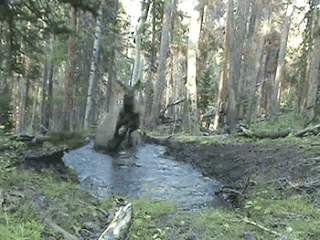Valuing our Forests
 |
| Figure 1 - Roger the Ranger |
When
school lets out for the summer, kids like you often have a lot of fun time to
spend with friends and family. When talking about fun trips with family
and friends, one common choice of interest are outdoor
vacations. However, forests are more than just a vacationing spot.
So before you're ready to visit the outdoors, you should understand the many
ways we as humans value the forests and rely on them for every day
life. Imagine being out with your family on a nice vacation on the
Appalachian Mountains. It’s a cool windy afternoon, and everyone is ready for a campfire
to cook food and keep warm. As soon
as you start the fire, Roger the Park Ranger
spots you and your family with his binoculars from the distance! As he walks
over to meet you and your family, your mother asks Roger why he became a park
ranger. "You see miss, the forests have so much to offer us as humans.
Without forests, our entire way of life would never be the same! Before I go, I
want to share some of the reasons we value forests and a little bit about what
I do," says Roger the Ranger.
The Air We Breathe
 |
| Figure 2 - Photosynthesis Diagram |
"Don't you just love the fresh air out here?" says Roger. Forests work like natural air factories to give us the oxygen we breathe. Using a process called photosynthesis, trees take in the carbon dioxide that we exhale and use that to create oxygen in the air for us to live! You can see how the process works looking at Figure 2. "In fact, just one adult tree can make as much oxygen in one season that it would take 10 people to inhale in a year!", says Roger the Ranger (1). Not only to trees create air for us to breathe, they can also filter the air we already have. Trees catch a variety of air pollutants that can mix into the oxygen we breathe, making the air safer for our lungs.
Animals and Habitat
The animals in the forest rely on the trees for homes and protection, much like the way we rely on our houses to shelter and keep us safe from harm. "The animals that live in the forest feed on the nuts and berries that trees grow, and in turn we as humans need the animals so that we can eat and become strong," says Roger. It turns out that nearly half of all known animals live in the forests together in a habitat (1). "A habitat is when different animals and plants live together in the same area", Roger notes. If there were no forests, the animals that live there wouldn't manage and we would have a hard time getting food on the dinner table. Amazingly enough, around 300 million people live in forests around the world, about 60 million of those people are tribal and rely entirely on the habitat of the forest (1)! Without forests, people or animals just wouldn't be as
happy as we are today.
 |
| Figure 3 - Animal Habitat |
Clean Drinking Water
Along
with filtering our air as mentioned above, trees also clean most of the
water that comes back to earth. Two-thirds of clean water in the United
States comes from rain that is filtered through forests (2). "Forests are
like giant sponges",
 |
| Figure 4 - Water filtering through forests |
The Role of a Park Ranger
Being a park ranger such as myself can be a tough job, but its also a rewarding one, says Roger the Ranger. Part of my job is making sure all visitors are safe and happy by giving knowledge about forestry and going over park rules (4). "The other role that I play is to keep the forests in check and to make sure all the trails are cleared," says Roger. As a park ranger, Roger knows the forest like the back of his hand! Therefore, any problems you see such as a blocked trail, a forest fire, or an over flowing river should be reported to a park ranger. Doing your part and letting a park ranger know of dangers can save an entire forest, and thanks to Roger the Ranger, we now know why
 | ||||
| Figure 6 - Roger the Ranger! |
References
1) McLendon, R. (2014, March 20). 21 Reasons Why Forests Are Important.
Retrieved from
http://www.mnn.com/earth-matters/wilderness-resources/blogs/21-reasons-why-forests-are-important
2) The Role of Forests in Water Purification. (2014). Retrieved from
http://www.seesouthernforests.org/case-studies/role-forests-water-purification
3) Southwest Florida Water Management District. Glossary. Retrieved from https://www.swfwmd.state.fl.us/education/kids/glossary/aquifer/
4) Forestry Degree. Job Duties and Responsibilities of a Park Ranger. Retrieved from forestrydegree.net/job-duties-and-responsibilities-of-a-park-ranger/
5) Park Ranger Binoculars [Photograph] (2014) Retrieved from http://beatnikhiway.com/2015/07/07/highway-america-actual-questions-asked-of-national-park-rangers/
6) Photosynthesis Graph [Photograph] Retrieved from
http://www.microbiologyonline.org.uk/about-microbiology/microbes-and-the-outdoors/carbon-cycle
7) Deer in Forest [Photograph] Retrieved from http://giphy.com/gifs/forest-deer-ys8zByv0Muaxa
8) Forest with flowing water [Photograph] Retrieved from http://giphy.com/gifs/jerology-green-waterfall-rain-forest-aTdynm9cfgWwE
9) Aquifer [Photograph] (2014) Retrieved from https://www.youtube.com/watch?v=ZTmioUWYMuQ
10) Park Ranger Lookout [Photograph] (2014) Retrieved from http://beatnikhiway.com/2015/07/07/highway-america-actual-questions-asked-of-national-park-rangers/
4) Forestry Degree. Job Duties and Responsibilities of a Park Ranger. Retrieved from forestrydegree.net/job-duties-and-responsibilities-of-a-park-ranger/
5) Park Ranger Binoculars [Photograph] (2014) Retrieved from http://beatnikhiway.com/2015/07/07/highway-america-actual-questions-asked-of-national-park-rangers/
6) Photosynthesis Graph [Photograph] Retrieved from
http://www.microbiologyonline.org.uk/about-microbiology/microbes-and-the-outdoors/carbon-cycle
7) Deer in Forest [Photograph] Retrieved from http://giphy.com/gifs/forest-deer-ys8zByv0Muaxa
8) Forest with flowing water [Photograph] Retrieved from http://giphy.com/gifs/jerology-green-waterfall-rain-forest-aTdynm9cfgWwE
9) Aquifer [Photograph] (2014) Retrieved from https://www.youtube.com/watch?v=ZTmioUWYMuQ
10) Park Ranger Lookout [Photograph] (2014) Retrieved from http://beatnikhiway.com/2015/07/07/highway-america-actual-questions-asked-of-national-park-rangers/

No comments:
Post a Comment